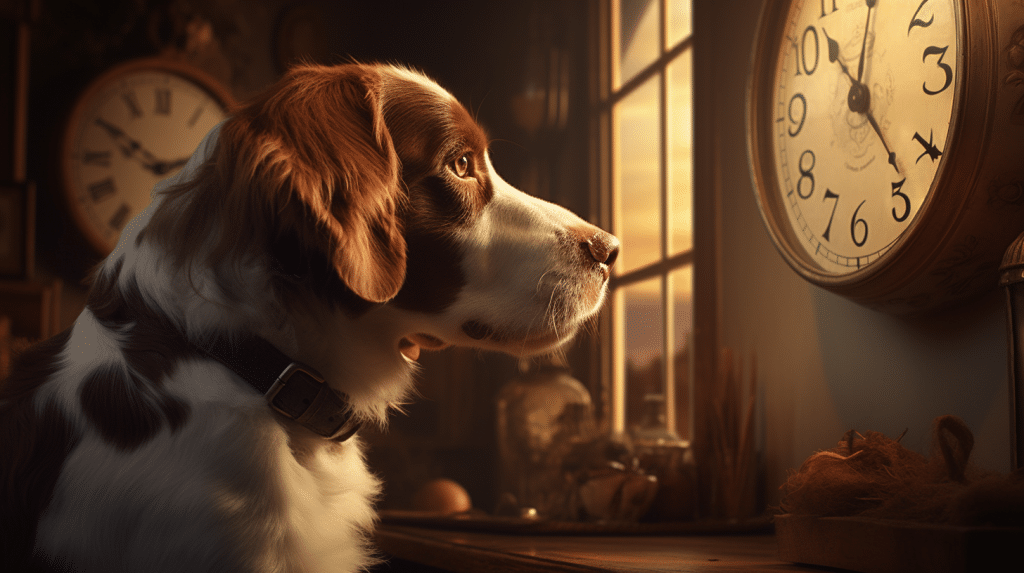Ever felt lonely? Imagine how your Brittany dog feels. It’s vital to understand your furry friend’s needs before leaving them alone. This guide provides insights on how long you can leave a Brittany dog alone, how solitude affects them, and ways to make them comfortable when you’re not around. Stick around, you’ll find helpful tips to ensure your pup’s well-being even when you can’t be there.
Understanding the Brittany Dog Breed
Before you can determine how long to leave your Brittany dog alone, you’ll need to understand the unique characteristics of this breed. Brittany dogs, originally bred for bird hunting, are known for their energy, intelligence, and strong desire to please. They’re naturally social creatures, requiring regular mental and physical stimulation to stay happy and healthy. This breed thrives on interaction with humans and other dogs, so it’s crucial that you’re able to devote a significant amount of time to them each day.
The temperament of your Brittany plays a significant role in how long they can be left alone. Generally speaking, these dogs are not well suited to long periods of solitude. Isolation can lead to destructive behaviors such as chewing or digging, and can also result in symptoms of separation anxiety, including excessive barking and house-soiling.
Your Brittany’s age and health status are also important factors to consider. Puppies and older dogs typically require more care and attention and should not be left alone for extended periods. Similarly, dogs with health issues may need frequent monitoring or medication administration.
Understanding your Brittany’s specific needs and behaviors is a necessary first step toward ensuring their wellbeing when you’re not home. By recognizing their inherent energy, social needs, and potential for anxiety, you’re better equipped to make informed decisions about their care. Remember, every dog is unique, and what works for one may not work for another. It’s important to tailor your approach to your individual pet’s needs.
The Impact of Loneliness on a Brittany Dog
You’ll find that prolonged periods of loneliness can have a significant impact on your Brittany dog’s mental and physical health. Brittany dogs, like many other breeds, are social animals and thrive best in an environment where they can interact with their owners or other pets.
When left alone for extended periods, they can develop various health issues and negative behavior patterns. These problems are not just temporary; they can have long-term effects on your Brittany dog’s overall well-being.
Here are some of the potential issues your Brittany dog might face when left alone for too long:
- Behavioral Problems: Dogs can develop destructive habits such as chewing furniture, excessive barking, or attempting to escape. These behaviors are often a result of stress and anxiety.
- Separation Anxiety: Brittany dogs are known for their strong attachment to their owners. When left alone, they might experience severe separation anxiety, which can be distressing for both you and your dog.
- Physical Health Issues: Lack of exercise and stimulation can lead to obesity and other related health issues in your Brittany dog.
- Mental Health Issues: Extended periods of loneliness can lead to depression in dogs. Symptoms may include loss of appetite, lack of enthusiasm, or changes in sleeping habits.
- Lack of Socialization: If your Brittany is not regularly interacting with other dogs or people, they may become fearful or aggressive.
To maintain your Brittany dog’s health and happiness, it’s crucial to ensure they’re not left alone for extended periods. If unavoidable, consider options like a dog walker, daycare, or a pet sitter to prevent loneliness.

How to Prepare Your Brittany Dog for Alone Time
When it’s necessary for your Brittany dog to be alone, you can take steps to make this experience less stressful for them, and one of the first steps is creating a safe and comfortable space. This could be a crate or a specific area of your home where your dog feels secure and relaxed. Ensure that this space is well ventilated, has a comfortable temperature, and is free from any hazards.
Next, consider using toys and puzzles to keep your Brittany entertained during alone time. Interactive toys, such as those that dispense treats when manipulated, can provide mental stimulation and reduce feelings of boredom. It’s important to rotate these toys regularly to maintain your dog’s interest.
Training your Brittany to be comfortable alone is also crucial. Start by leaving them alone for short periods, gradually increasing the duration as they become more comfortable. This process, known as desensitization, is proven to reduce separation anxiety in dogs.
Another key aspect is maintaining a consistent routine. Dogs thrive on predictability, and a regular schedule for feeding, walks, and playtime can provide a sense of security. According to a study published in the journal Applied Animal Behaviour Science, dogs that had a regular routine showed less signs of stress when left alone.
Finally, ensure your Brittany gets plenty of exercise before you leave. A tired dog is a happy dog, and physical activity can reduce anxiety and promote relaxation. So, take your Brittany for a long walk or a game of fetch before you head out.
Signs Your Brittany Dog Is Not Coping Well Alone
Despite your best efforts in preparing your Brittany for alone time, it’s possible they might still struggle with being left alone, and certain signs and behaviors can provide insight into this. A Brittany is a social, active breed and if they’re not coping well with solitude, they may exhibit behaviors that are out of character or indicative of stress.
Recognizing these signs is crucial in ensuring your dog’s emotional well-being and preventing potential negative impacts on their health. Here are some signs to look out for:
- Excessive Barking or Howling: If your neighbors report that your Brittany is unusually noisy when you’re not at home, this could indicate separation anxiety.
- Destructive Behavior: Finding chewed furniture or other objects can be a sign your Brittany is trying to cope with their stress.
- Pacing or Restlessness: Brittanys are energetic by nature, but persistent or aimless pacing may reveal anxiety.
- Changes in Eating Habits: If your Brittany is eating significantly more or less when you’re away, this could be a red flag.
- Unusual Potty Behavior: Indoor accidents despite being potty-trained could mean your Brittany is distressed.
If you notice these signs, don’t panic. There are many strategies you can employ to help your Brittany adjust better to being alone. Consult with a professional dog trainer or a veterinarian for advice tailored to your dog’s specific needs. Remember, your Brittany’s health and happiness are intertwined, so it’s important to ensure they’re comfortable with their alone time.
Tips and Tricks to Keep Your Brittany Dog Engaged While Alone
Several tricks can help keep your Brittany dog busy and engaged while they’re home alone. Brittany dogs are intelligent and active, requiring mental and physical stimulation. Here are some methods backed by canine behaviorists that can ensure they stay entertained and content during your absence.
Firstly, toys play a pivotal role. Invest in puzzle toys that dispense treats when solved. These toys can keep your dog busy for hours, and they’ll get rewarded for their efforts. Also, rotating toys can keep things exciting for them. Don’t give them access to all their toys at once; instead, swap them out every few days.
Secondly, consider setting up interactive pet cameras. These cameras not only allow you to monitor your pet but also interact with them. Some even dispense treats and allow you to talk to your dog, giving them the illusion of companionship.
A third strategy revolves around exercise. A well-exercised dog is a content dog. Ensure your Brittany gets a good run or walk before you leave the house. This could help tire them out and make them more likely to rest while you’re gone.
Lastly, training and socialization are crucial. Teach your dog commands and tricks that they can perform alone. The process of recalling and executing these instructions can keep them mentally stimulated.

Frequently Asked Questions
What Kind of Health Issues Can a Brittany Dog Develop if Left Alone for Too Long?
If you leave your Brittany dog alone for extended periods, they could develop health issues. These might include anxiety-related disorders, leading to destructive behavior, loss of appetite, and even self-harm. They might also become overweight due to lack of exercise. It’s essential to ensure your dog has enough social interaction and physical activity to maintain their health and happiness.
Are There Specific Toys or Items That Can Help a Brittany Dog Cope Better With Being Alone?
Ironically, you’re looking to leave your Brittany alone by keeping it company. Toys and items like puzzle feeders, chew toys, or treat-dispensing toys can keep your dog entertained while you’re away. These don’t replace your presence, but they can help reduce anxiety. Evidence suggests that leaving a radio or TV on for background noise can also help. However, remember, these are short-term solutions. Prolonged loneliness can lead to health issues in your Brittany.
How Does a Brittany Dog’s Age Affect Its Ability to Tolerate Being Alone?
Your Brittany dog’s age significantly impacts its ability to tolerate solitude. Puppies can’t be left alone as long as adult dogs. They need more social interaction and bathroom breaks. On average, a puppy can handle 1 hour alone for each month of age. Older dogs, however, can manage 4-6 hours, but don’t overdo it. Chronic loneliness can lead to behavioral problems. It’s crucial to gauge your dog’s comfort level and adjust accordingly.
Are There Specific Training Techniques That Can Help a Brittany Dog Deal With Separation Anxiety?
Yes, specific training techniques can help your Brittany dog cope with separation anxiety. Crate training from a young age can provide a secure space for your dog when you’re not home. Gradual desensitization training can also be effective. It involves leaving your dog alone for short periods initially, then gradually increasing the duration. However, each dog is unique and what works for one might not work for another. Consulting a professional trainer is always a good idea.
Can Hiring a Pet Sitter or Enrolling the Brittany Dog in a Doggy Daycare Help With Its Loneliness Problems?
Yes, hiring a pet sitter or enrolling your Brittany in doggy daycare can significantly help with their loneliness issues. Pet sitters provide companionship and care when you’re away, reducing anxiety. Doggy daycare offers socialization with other dogs, which is vital for their well-being. However, you need to ensure they’re comfortable in these environments. Start gradually and observe their behavior. It’s not a quick fix but can greatly improve their quality of life.
Conclusion
In conclusion, don’t forget that your Brittany dog shouldn’t be left alone for more than 4-6 hours. They’re a social and energetic breed that thrives on interaction. Interestingly, studies show that dogs left alone too long can develop separation anxiety, which affects approximately 20% of dogs nationwide. Make sure to provide plenty of stimulation to keep your Brittany happy and healthy when you can’t be there.


